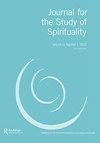Editorial
IF 0.8
0 RELIGION
引用次数: 0
Abstract
As I began to write this Editorial, I received the welcome news thatmy two daughters had successfully completed amarathon-length (26.2miles) sponsored hike across the SouthDowns of England to raise money for the charity Cancer Research UK. Their team of five was called ‘Trail Magic’, a nod towards one daughter having walked the entire length of the Appalachian Trail in the USA some years ago, accompanied and spurred on by her sister for the first 500 of the 2000+miles of the trail. They have often spoken of the ‘trail magic’ that occurred onmany occasions during that gruelling American trek: of times when, exhausted and hungry, they would come across a box of cookies left in one of the shelters by an anonymous wellwisher; or a signposted invitation to a remote homestead just off the Trail where the owners would offer refreshing drinks and a comfortable respite from the hike. In a good luck message for the South Downs Way event, I sent the team an image of a footpath on which were superimposed the words: ‘Of all the paths you take in life, make sure a few of them are dirt.’ It seemed an apt sentiment to apply not only to a day devoted to hiking for a good cause on one of England’s most ancient and scenic pathways; but to a day that would inevitably contain some rough, hard-going moments as, with the journey’s end still nowhere in sight, weary legs would have to be coaxed up yet another tough uphill path in order to experience the joys of reaching the finishing line. While I was searching for the provenance of the quotation, it struck me that its sentiment might be applied equally well to the study of spirituality, and especially to the particular mix of studies included in this issue, as I shall outline in a moment. I had thought the words were those of John Muir (1838-1914), the writer, conservationist and ‘founding father’ of the National Parks movement. I have long appreciated his holistic perspective and, when trying to explain the difficulty of ‘getting hold’ of what spirituality ‘is’, I have sometimes drawn on his much-quoted observation: ‘When we try to pick out anything by itself, we find it hitched to everything else in the Universe’ (Muir 1911/1988, 110). Recording this in his diary on one of his first expeditions in the Sierra Nevada mountains, Muir continued:社论
当我开始写这篇社论时,我收到了一个好消息,我的两个女儿成功地完成了由阿玛马拉松(26.2英里)赞助的穿越英格兰南部唐斯的徒步旅行,为慈善机构癌症研究英国筹款。他们的五人团队被称为“Trail Magic”,这是对几年前一个女儿在美国阿巴拉契亚山脉徒步旅行的致敬,在姐姐的陪伴和激励下,她完成了2000多英里的第一个500英里的路程。他们经常谈到在那次艰苦的美国跋涉中,在任何场合都会发生的“踪迹魔法”:有时,他们筋疲力尽,饥肠辘辘,会遇到一位匿名祝福者留在其中一个避难所的一盒饼干;或者是一个路标上的邀请,邀请主人去小径旁的一个偏远的宅地,在那里主人可以提供清爽的饮料和徒步旅行的舒适休息。在South Downs Way活动的好运信息中,我给团队发了一张人行道的图片,上面叠加着这样的文字:“在你生活中走过的所有道路中,确保其中有几条是泥土。”这似乎是一种恰当的情绪,不仅适用于在英格兰最古老、风景最优美的小路上为一项美好的事业徒步旅行的一天;但在这一天,不可避免地会有一些艰难的时刻,因为旅程的终点仍然遥遥无期,疲惫的双腿将不得不被哄上另一条艰难的上坡路,才能体验到达终点线的乐趣。当我在寻找这段引文的出处时,我突然想到,它的情感可能同样适用于精神研究,尤其是本期所包含的特定研究组合,我稍后将对此进行概述。我原以为这些话是约翰·缪尔(1838-1914)的话,他是作家、自然保护主义者和国家公园运动的“创始人”。长期以来,我一直欣赏他的整体观点,当我试图解释“掌握”什么是“精神”的困难时,我有时会引用他经常引用的观察:“当我们试图自己挑选任何东西时,我们发现它与宇宙中的其他一切都联系在一起”(缪尔1911/1988110)。缪尔在他的第一次内华达山脉探险日记中记录了这一点,他继续说道:
本文章由计算机程序翻译,如有差异,请以英文原文为准。
求助全文
约1分钟内获得全文
求助全文
来源期刊

Journal for the Study of Spirituality
RELIGION-
CiteScore
2.50
自引率
7.10%
发文量
25
期刊介绍:
Journal for the Study of Spirituality is a peer-reviewed journal which creates a unique interdisciplinary, inter-professional and cross-cultural forum where researchers, scholars and others engaged in the study and practices of spirituality can share and debate the research, knowledge, wisdom and insight associated with spirituality and contemporary spirituality studies. The British Association for the Study of Spirituality (BASS) organises a biennial international conference and welcomes enquiries about membership from those interested in the study of spirituality in the UK and worldwide. The journal is concerned with what spirituality means, and how it is expressed, in individuals’ lives and communities and in professional practice settings; and with the impact and implications of spirituality in, and on, social policy, organizational practices and personal and professional development. The journal recognises that spirituality and spiritual values can be expressed and studied in secular contexts, including in scientific and professional practice settings, as well as within faith and wisdom traditions. Thus, Journal for the Study of Spirituality particularly welcomes contributions that: identify new agendas for research into spirituality within and across subject disciplines and professions; explore different epistemological and methodological approaches to the study of spirituality; introduce comparative perspectives and insights drawn from different cultures and/or professional practice settings; aim to apply and develop sustained reflection, investigation and critique in relation to spirituality and spiritual practices; critically examine the values and presuppositions underpinning different forms of spirituality and spiritual practices; incorporate different forms of writing and expressions of spirituality.
 求助内容:
求助内容: 应助结果提醒方式:
应助结果提醒方式:


